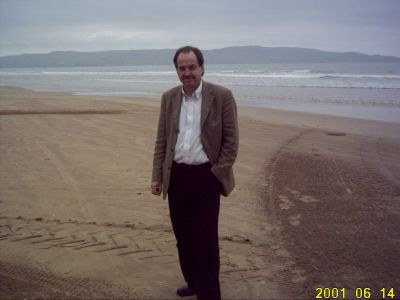| | 
Barry Lowe: Co-founder, Centre for Conflict Resolution Journalism. Senior Lecturer in Journalism at Thames Valley University.
 Barry Lowe is a Co-founder of the Centre for Conflict Resolution Journalism (CCRJ). Barry is also a writer and editor of the CCRJ Journal "The Ethical Media Review". Barry Lowe is a Co-founder of the Centre for Conflict Resolution Journalism (CCRJ). Barry is also a writer and editor of the CCRJ Journal "The Ethical Media Review".
Since September 2000 Barry Lowe has been Senior Lecturer in Journalism & Media at the London College of Music and Media (LCMM). Barry's new responsibilities at the CCRJ will complement his ongoing, full-time teaching commitment at the London College of Music and Media, informing and underpinning his research work and scholarly activity.
The role played by journalists in creating democratic societies is the focus of a wide- ranging project being undertaken by Barry Lowe. Lowe has received funding totaling more than £190,000 from the Foreign and Commonwealth Office to research modes of production and professional attitudes among journalists in transitional countries, and to design professional development programmes for these journalists.
His current focus is the Middle East where he is working with journalists from Saudi Arabia, Lebanon, Palestine, Afghanistan and Egypt."The programme is based on my belief that journalists are the prime messengers of democratic reform. Mobilising the news media to spread the democracy message is the most effective way of speeding up the reform process," Lowe said.
"I began working in this area last year when the Department for International Development and the Commonwealth Secretariat provided funding for me to undertake a pilot project in Cameroon, a totalitarian West African state that has begun taking tentative steps towards democratic reform.
"This project involved an initial scoping study of Cameroon news media institutions and journalists and, in a follow-up visit, the delivery of a training programme for journalists on reporting elections."
Lowe has since combined forces with the School of Oriental and African Studies (SOAS) for his Middle East-based programme. He works with a SOAS research and consultancy centre called the London Middle East Institute.
"Saudi Arabia is ruled by one of the most traditional and authoritarian governments in the world today so when the first election there in 70 years was announced - a limited franchise municipal poll - I approached the Foreign Office about funding a programme involving Saudi journalists. The Foreign office backed that plan and went on to support a similar programme for Lebanese journalists, ahead of their general election in June. The programme has since been further extended to include other Middle Eastern countries.
"I am currently working on a project for journalists from Afghanistan, ahead of the election of a new Afghan legislative assembly in September."
Each project involves researching various aspects of news production in the target country, identifying and recruiting a group of journalists to the programme, designing a training programme in election reporting and evaluating the outcomes.
Lowe's interest in journalists and democratic reform has also seen him deliver recent projects in Azerbaijan (funded by the European Commission and the Dutch Foreign Ministry) and in the Malaysian state of Sarawak (funded by a Malaysian government agency).
Lowe is a former journalist who covered conflicts in the Middle East in the 80's. He also reported from Eastern Europe, South East Asia and the Pacific.
"My work as a foreign correspondent enabled me to build up extensive networks of journalists in many parts of the world. These networks have now become the foundation for the project work I do."
May 2009--
CCRJ Co-founder Barry Lowe has been awarded
a grant from the government's Department for International Development
(DfID).
The grant of £10,000, a Develepment Education Fund
Mini Grant, will pay for a project to produce content on developing
world issues for UK's HE journalism curricula.
Barry said the main activity would be training a
group of exiled journalists - journalists from developing countries who
fled to the UK to escape persecution - in teaching skills.
These journalists would then be employed as guest
lecturers to deliver seminars on developing world issues to journalism
classes in UK universities.
Barry told MyArts: "I'm hoping
this small grant will lead to more successful bids for funding with
DfID. DfID is a significant international donor, distributing hundreds
of millions of pounds to support projects centred on developing world
issues."
***********************************************************************************
***********************************************************************************
| |
